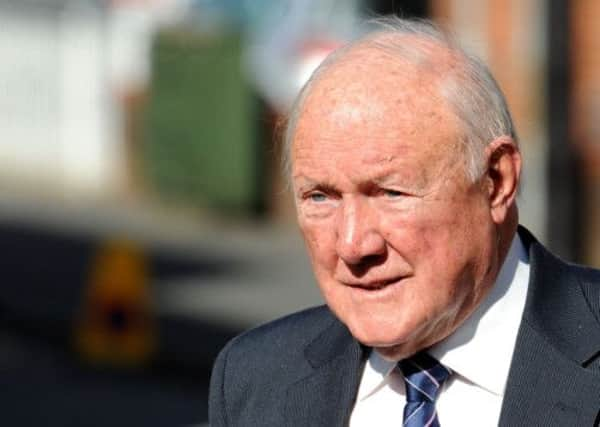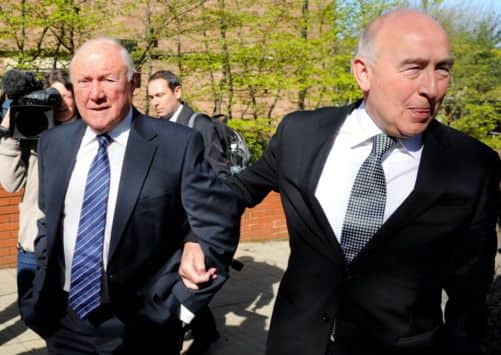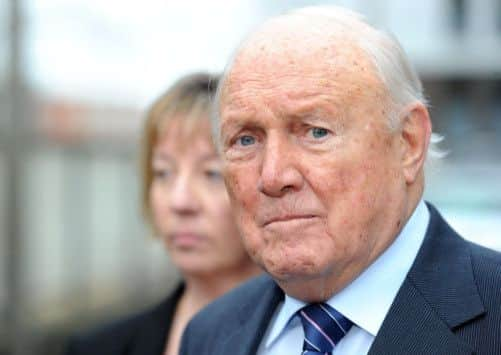After Savile and Stuart Hall, BBC unveils charter for whistleblowers


A major report into sexism and bullying at the corporation has found that some staff are scared of making complaints about inappropriate behaviour.
But the 80-page report by barrister Dinah Rose found that although sexual harassment was found to be “very rare”, there was some evidence of inappropriate behaviour and bullying.
Advertisement
Hide AdAdvertisement
Hide AdIt found some behaviour appeared to go unchallenged by senior managers and the report said: “Some individuals are seen as being ‘untouchable’ due to their perceived value to the BBC.”


The report says the BBC needs to be clearer about the expected behaviour of staff and issues need to be dealt with more quickly.
It recommends reworking the bullying and harassment policy, working with unions, to put an increased emphasis on resolving issues informally, which the corporation has agreed to.
It also wants to see a confidential helpline to support staff, changes to the way complaints are heard and increasing awareness of how to deal with any problems.
Advertisement
Hide AdAdvertisement
Hide AdResponding to the report, published today, the BBC said it will remove derogatory statement restrictions - the gagging clauses which are common in many jobs - from future BBC contracts and compromise agreements.


The clauses were not enforced during the report’s preparation to allow staff to speak more freely. However the BBC said it would continue to use confidentiality agreements where necessary.
The corporation says it will cut the time taken to hear grievances by two-thirds, and in future they will be heard by managers from other divisions.
The review was set up after the Jimmy Savile scandal erupted last year, alongside an inquiry into the culture and practices of the BBC and another into the decision-making process which led to a Newsnight item probing the DJ’s activities being dropped.
Advertisement
Hide AdAdvertisement
Hide AdToday’s report said there was evidence that sexual harassment does occur at the BBC “but it is now very rare”. Many of the submissions it received dated back to “10, 20 or more years ago”,
It said: “There have been 37 formal complaints of sexual harassment over the past six years, an average of only six per year, out of a population of approximately 22,000 staff and 60,000 freelancers who work with the BBC each year.
“Sexual harassment was not a common theme of the experiences of unacceptable or inappropriate behaviour reported by contributors in the course of the review.”
Michelle Stanistreet, general secretary of the National Union of Journalists, welcomed action to tackle bullying, adding: “It is quite clear that bullying has become an institutionalised problem at the BBC, one that has taken hold over many years.
Advertisement
Hide AdAdvertisement
Hide Ad“The report’s findings underline the fear factor that exists, particularly for those staff on freelance and short-term contracts, who know that speaking out and rocking the boat could damage their career prospects.
“Many see that bullies have been allowed to get away with shocking behaviour right under the noses of senior management, so have no faith that complaining will bring any redress.”
The NUJ said its submission to the corporation demonstrated the “overwhelming scale” of the problem.
Ms Stanistreet continued: “We included over 70 pieces of testimony in our report, and many more members, past and present BBC staff, contacted me but were too frightened to have their own shocking experiences included in case they were identified. The impact on individuals who’ve experienced appalling treatment at work has been immense.
Advertisement
Hide AdAdvertisement
Hide Ad“Our submission was eye-watering stuff - people have been bullied because of their sexuality or their race, women have been subjected to the most awful sexism, journalists have been openly attacked about their age and there are many others whose lives have been made unbearable for no discernible reason. People have been picked off simply because their face doesn’t seem to fit.
“That the BBC is now taking action and getting a grip of what is a toxic problem can only be a good thing. It is positive news that investigations will be carried out by an independent panel in future, although we remain concerned about how efficiently this can be delivered by an in-house approach.”
BBC director general Tony Hall said in a message to staff: “The report itself doesn’t always make easy reading. However it also provides us with a realistic assessment of where we need to improve, positive examples we can draw on and a blueprint to make these changes.
“There will be those who will use the contents of this report to attack and criticise the BBC. However I believe that we are a stronger organisation for being open and transparent about our failings where we have them. I don’t believe there are many organisations in this country who would be as frank as we have been and as prepared to deal with these issues head on.
Advertisement
Hide AdAdvertisement
Hide Ad“It’s clear that we need to get better at tackling issues when they arise and make sure that the good behaviour we know exists becomes the norm across the organisation. Finally we need to be clearer around our expectations of the behaviour of everyone who works here, including staff, managers, freelancers and talent.”
Mr Hall said there are a large number of recommendations to be implemented from the report, adding: “We’ll be working with the unions on helping people to try and resolve any issues informally before going through formal processes.
“Where we do hear complaints we’ll change the way we deal with them so they will be heard by a manager and HR contact from outside the affected division.
“For managers, we’ll be providing greater support from senior leaders as well as new training opportunities.
Advertisement
Hide AdAdvertisement
Hide Ad“From today we are also announcing the removal of so-called ‘gagging clauses’ from future BBC contracts and compromise agreements in order to show our commitment to change.”
Page 3: 10:48
The report said the review had been offered no specific evidence of “talent” at today’s BBC being involved in any sort of sexual harassment.
And the report found that where there had been suggestions of talent demanding special treatment, it was their agent who was the cause of the actual difficulties.
Where there had been claims of sexual harassment at the BBC, the report noted there were two “common features”.
Advertisement
Hide AdAdvertisement
Hide AdThese were: “A tendency for the victim to be young and in the early stages of their career and almost exclusively female (with the exception of some gay men reporting incidents); and the perpetrators are in positions of influence who clearly feel confident that they can act freely.”
It said in the small number of recent instances victims felt they had nowhere safe and confidential to report their plight, and they had no confidence the BBC would know how to deal with the matter.
Some people described situations where male staff had a “recurring tendency to seek out, flatter and support younger female freelancers and contractors above their male counterparts”, although “there was no suggestion of sexual wrong-doing”.
However many made comments about the large number of senior positions that are occupied by women , and said sexist behaviour tolerated in society as a whole, including the BBC, in the 1970s and 1980s had now disappeared and “the culture had improved significantly”.
Advertisement
Hide AdAdvertisement
Hide AdBBC director-general Tony Hall said: “Our staff are our greatest strength and this report shows that they are proud to work for the BBC and that we have a culture based on values that are strongly held.
“Parts of this report do however make uncomfortable reading. We need to be honest about our shortcomings and single minded in addressing them.
“I want zero tolerance of bullying and a culture where people feel able to raise concerns and have the confidence that they will be dealt with appropriately. I also want people to be able to speak freely about their experiences of working at the BBC so that we can learn from them.
“The measures we are taking today, including the removal of so called ‘gagging clauses’, show our commitment to change. This agenda will be a priority for the senior management team going forward.”
Advertisement
Hide AdAdvertisement
Hide AdLucy Adams, the BBC’s human resources director, said: “Clearly bullying is an issue that needs to be dealt with within the BBC but feedback from freelancers and Bectu’s own survey findings have shown there are issues in this area across the industry as a whole.”